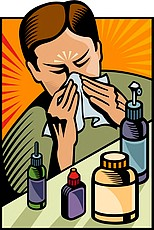 We’re well into hay fever season which, for a fifth of the
UK population, means relentless cold-like symptoms, headaches and general
exhaustion. If this sounds all too familiar, it’s the perfect time to review
the steps you can take to help reduce the intensity of your symptoms and make
your day to day life easier! (1)
We’re well into hay fever season which, for a fifth of the
UK population, means relentless cold-like symptoms, headaches and general
exhaustion. If this sounds all too familiar, it’s the perfect time to review
the steps you can take to help reduce the intensity of your symptoms and make
your day to day life easier! (1)
What is hay fever?
Hay fever, also known as seasonal allergic rhinitis, is a
condition caused by the immune system’s reaction to pollen. Pollen is a fine
powder produced by plants for the purpose of reproduction, and is easily
carried by the air and therefore breathed in and deposited on hair, skin and
clothes. (1)
Symptoms include sneezing, coughing, nasal congestion and running,
reduced sense of smell, itching of the eyes, nose, throat and ears, headache
and temple pain, earache and a lack of energy. Hay fever may also worsen asthma
symptoms. (2)
Symptoms tend to be present for the whole hay fever season
(March to September), particularly when the pollen count is high. This usually
happens on hot and humid days with a breeze or wind. (2)
How is hay fever
treated?
Antihistamines are the most common medical treatment for hay
fever symptoms and can be purchased over the counter in pharmacies. They work
by antagonising the effects of histamine, a chemical produced by the immune
system in response to allergens. This will help with all symptoms.
Over-the-counter antihistamines include chlorphenamine,
acrivastine, cetirizine and loratadine
and are available as tablets and oral solution. Chlorphenamine is a ‘drowsy’
antihistamine, so is useful for people who have trouble sleeping due to their
symptoms, whereas acrivastine, cetirizine and loratadine are considered
‘non-drowsy’ and may be more suitable for daytime use, driving, working, school
and exam time.
Other treatments that can be bought over the counter include
steroid nasal sprays (beclometasone
or fluticasone), decongestant nasal
sprays (xylometazoline), and saline
nasal sprays, which can help with stubborn congestion not relieved by
antihistamines, and sodium cromoglicate
eye drops to help specifically with itchy eyes.
If your symptoms still persist after trying medicines from
the pharmacy, your GP can help. Other antihistamines unavailable over the
counter, such as fexofenadine, can
be prescribed, as can a wider range of stronger steroids in tablet or nasal
spray form.
If this also fails, your GP may consider referring you to a
specialist for immunotherapy treatment. This involves administering injections
of low doses of pollen at regular intervals, usually starting around December
time, to gradually build your immunity to pollen. Once hay fever season comes
around, your body should have had enough exposure to no longer treat pollen as
an allergen, therefore symptoms should not develop. Unfortunately, this is not
a cure - you’ll need to have this done every year. (2)
What else can I do to
help ease my hay fever symptoms?
Try to avoid going outside whenever possible, and particularly
early in the morning and late in the afternoon/early evening. This is when
pollen counts are highest. Also, avoid opening windows and doors in the house,
and don’t allow outdoor pets in if possible. Vacuum daily if you can - consider
investing in a vacuum incorporating a HEPA filter - and dust surfaces each day
with a damp cloth. And although it seems obvious, don’t bring flowers into your
house. (1, 2)
If you must go outside, create as many barriers as you can
between you and the pollen! Protect your eyes with wraparound sunglasses,
protect your airways by applying petroleum jelly around your nostrils, and stop
pollen from getting into your car by attaching pollen filters to the air vents.
Washing clothes, showering or bathing and washing hair after going outside will
wash away any pollen stuck to you or your clothes. And don’t proceed to dry
your clothes on the line - they’ll only become covered in pollen again! (2)
Stick to paths and pavements where possible, as walking on
grass can release pollen into the air. Cutting grass also has this effect, so
let someone else mow the lawn! (2)
Smoking and breathing in other people’s smoke can worsen hay
fever symptoms, so avoid this at all costs. (2)
Click here for further information and
support from Allergy UK.
References
- BBC News. Tips for reducing hay fever symptoms [cited 12 June 2018]. Available at: https://www.bbc.co.uk/news/health-44381799
- NHS Choices. Hay fever [cited 12 June 2018]. Available at: https://www.nhs.uk/conditions/hay-fever/
Author: Gabby Gallagher MPharm
Medically reviewed by: Superintendent pharmacist Margaret Hudson BSc(Hons)MRPharmS 13/06/18